“When I was looking through tweets of someone asking for suggestions on how to get to the airport for a midnight flight, I saw most comments suggesting they go early and wait at the airport. I found that ridiculous. Does one have to struggle so much for safety?” questions Bhuvana Rani.
Today, Bhuvana is an advocate by day and a cab driver by night. She joined GoPink Cabs in 2016, and enjoys her job. “When people take our cabs, we see that their families are relieved since safety is ensured. Many solo passengers sleep peacefully throughout the ride and nothing gives me more satisfaction than that.” Along with pre-booking, there are on arrival rides, which are accepted by the driver present at the airport, she adds.
As an independent legal practitioner, Bhuvana finds time to rest during the day. “As an advocate I see justice taking time to be served because of lack of evidence and other reasons. However, here we get to provide immediate service to women by ensuring their safety and security, which is very rewarding.”
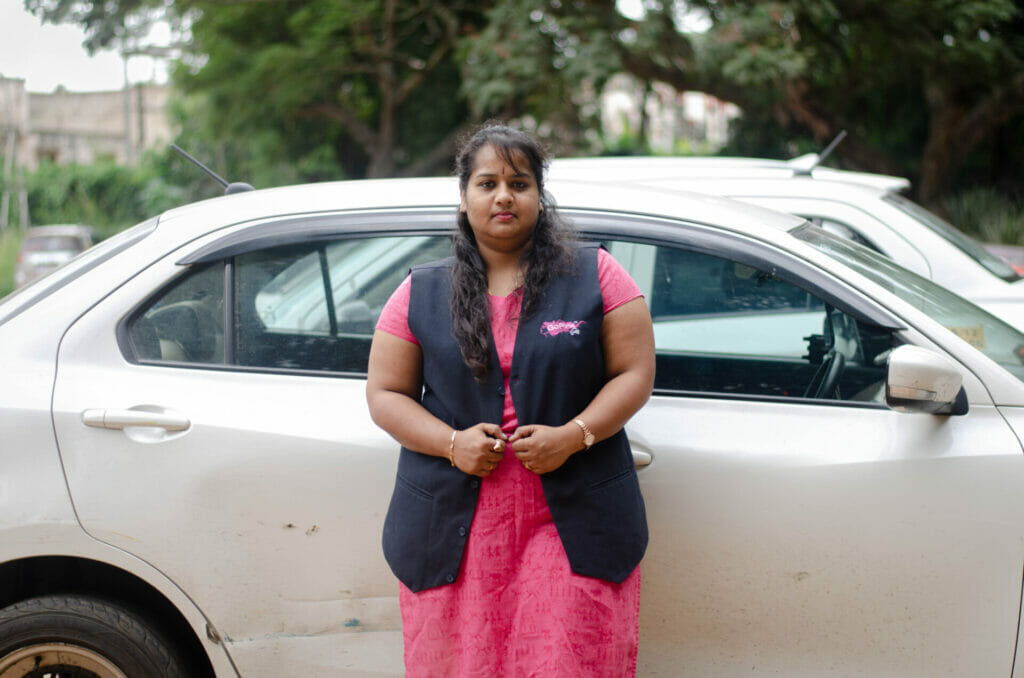
Like Bhuvana, 28-year-old Bhumika D R is a part-time driver with GoPink. Bhumika, who is also a music producer, has 12 years experience in driving. In less than a month of her job, she has had stress free, satisfactory duty at the company. She opted for night shift as she enjoys driving at night with less traffic. “Initially, it was difficult to drive during nights, but now I have got used to the schedule of resting in the mornings,” she says.
Since the pay is on a per ride basis, she finds it financially sufficient to meet her daily needs with an approximate earning of about Rs 30,000-40,000 per month. She is experienced in jiu-jitsu and kickboxing. She had to discontinue her medical studies for a brief period but is planning to resume it in a few months. “If women are confident enough, they can overcome any situation,” she says.
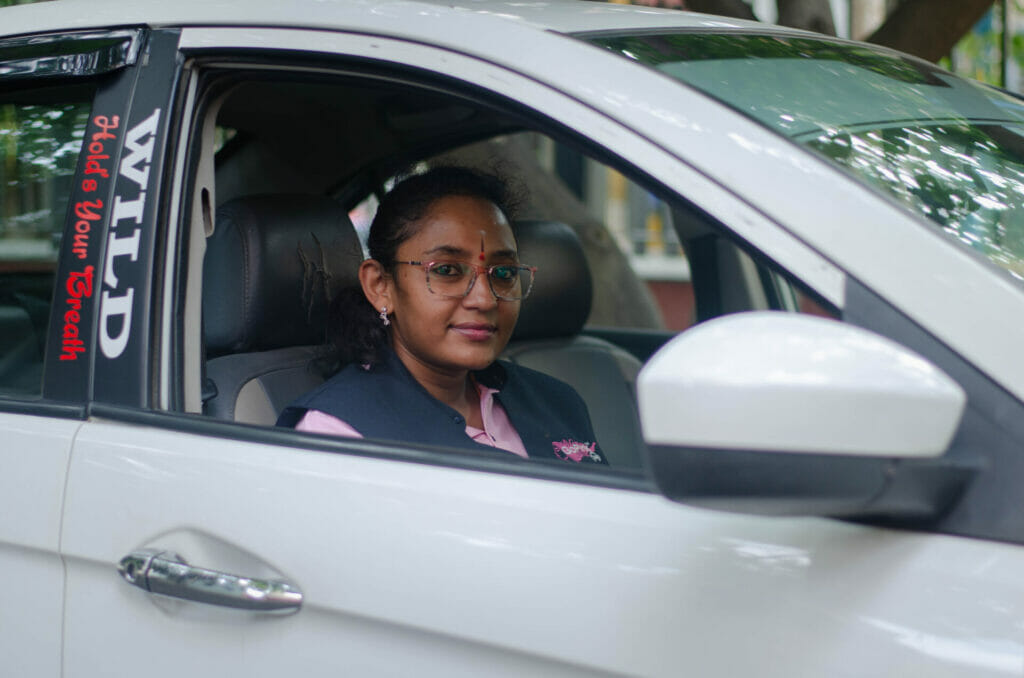
Kalyani Krishna, fleet manager at GoPink, has been working with the team as a trainer and driver since 2015. The 57-year-old passionate driver worked as a training instructor at Maruti Suzuki before joining GoPink. She took over training the first batch of GoPink drivers, post which she joined the team full-time. She trains the women from early morning till afternoon. In the evenings, she drives passengers to the airport. “We don’t have any fixed timings or login time, our rides are dependent on bookings. However, we are asked to cover 90 trips per month and most girls can cover 3-4 trips per day.” She adds that there is leave flexibility during illness and periods.
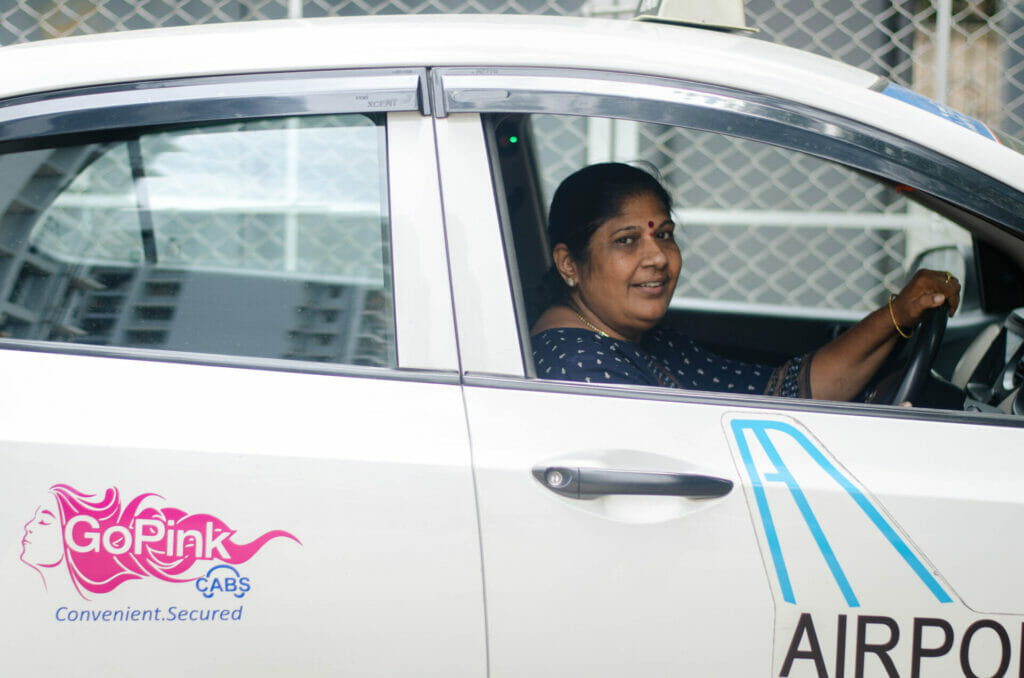
All women entrepreneurs
GoPink Cabs was started in 2015. It was set up post the Delhi Nirbhaya case to ensure safe rides for women by women.
“We started our entrepreneurial journey thinking it would be easy to get drivers. Since we see a lot of men who drive, we assumed we might find women easily too. But we could not find any women taxi drivers,” says Anuradha Udayshankar, co-founder of GoPink Cabs.
GoPink Cabs was started by three women: Anuradha Udayshankar, Kalyani Mohan, and Sunila Suresh, with the aim of not only providing safe rides for women but also ensuring financial independence for women from underprivileged backgrounds by offering training and employment.
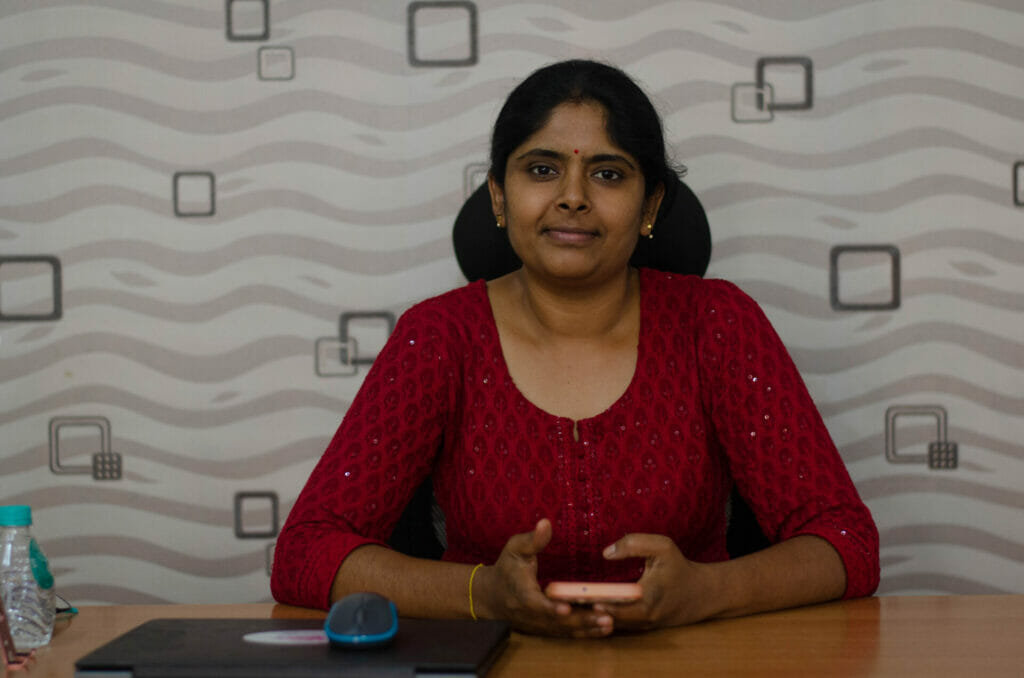
Dealing with a patriarchal society was not the only challenge they had to face when they first started out. “We had financial burden. But we also faced difficulties in finding women who are passionate to drive and train them efficiently,” says Anuradha.
In the initial stages, GoPink approached NGOs like Action Aid, and other institutes like Abalashrama and Abhayashrama, to recruit women drivers. “Under the CSR programme of Maruti Driving School, a programme called Unnati was started. For this, we designed a 50-hour training model, combining both theoretical and practical classes, to train our girls free of cost. We trained about 150 chauffeurs, from whom we selected 15 candidates,” says Kalyani Mohan, co-founder of GoPink Cabs.
Initial journey
When GoPink started, an all-women taxi service was still a new concept in Bengaluru, say the co-founders. “Everyone kept questioning how women would drive. Today, our girls have proved them wrong,” Anuradha says. They started with a small number of women drivers. Only four or five women from each training batch of a 100 would be eligible to drive. However, the team expanded their fleet amid uncertainties and doubts.
Initially, they offered services for schools, pregnant women, senior citizens, and corporate offices within the city. However, they wanted to expand their operations and that is when they branched out to airport rides. Due to a rule that it is compulsory for a cab company to own 100 cars (they couldn’t afford it at the time), the team was unable to get approval from the airport. However, after approaching several ministers and partnering with the Karnataka State Tourism Development Corporation Limited (KSTDC), they launched 10 cab services to and from Kempegowda International Airport.
Read more: Crimes of passion: Experts point at the lack of support systems needed to protect women
“When we started out, people could not see the potential of this initiative. Most women would take up indoor entrepreneurial startups like making pickles, tailoring etc. However, in eight years we have seen more women embracing their love for driving,” Kalyani adds.
Drivers’ safety ensured
All drivers are trained in self-defence. Training is provided by Action Aid and Head Held High NGOs. Additionally, all cars have panic buttons to alert the nearest Hoysala car or police station to the drivers’ or passengers’ rescue. Every driver has been encouraged to install Suraksha App and is equipped with a pepper spray for their safety.
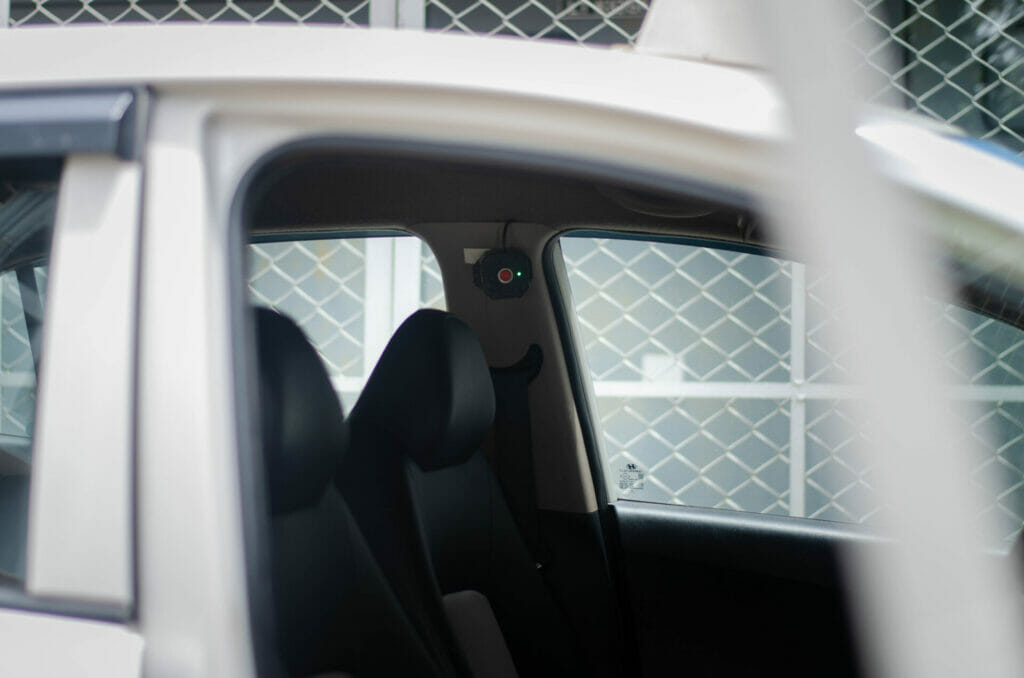
If a chauffeur has been in the service of the company for three years and pays the EMI for the car, then the ownership of the car will be transferred to them. “Previously, we had an agreement of four years, but since diesel vehicles are being phased out, we brought it down to three years,” says Anuradha. Part timers can drive in their personal vehicles by signing a one-year contract.
TaxShe prioritises safety
Vandana Suri, started TaxShe, another all-women cab service in the city, in 2016. It offers services to only women and children. “If you look at the driving training industry and cab service industry, there are very few women. When we talk about mobility, there is hardly any discussion about safety, that is why we need more all-women cab services,” says Vandana, an ex-investment banker.
TaxShe is a private company that has a hybrid work model. They work with their in-house NGO, Neeva Foundation, which employs marginalised women and trains them free of cost for about six months.
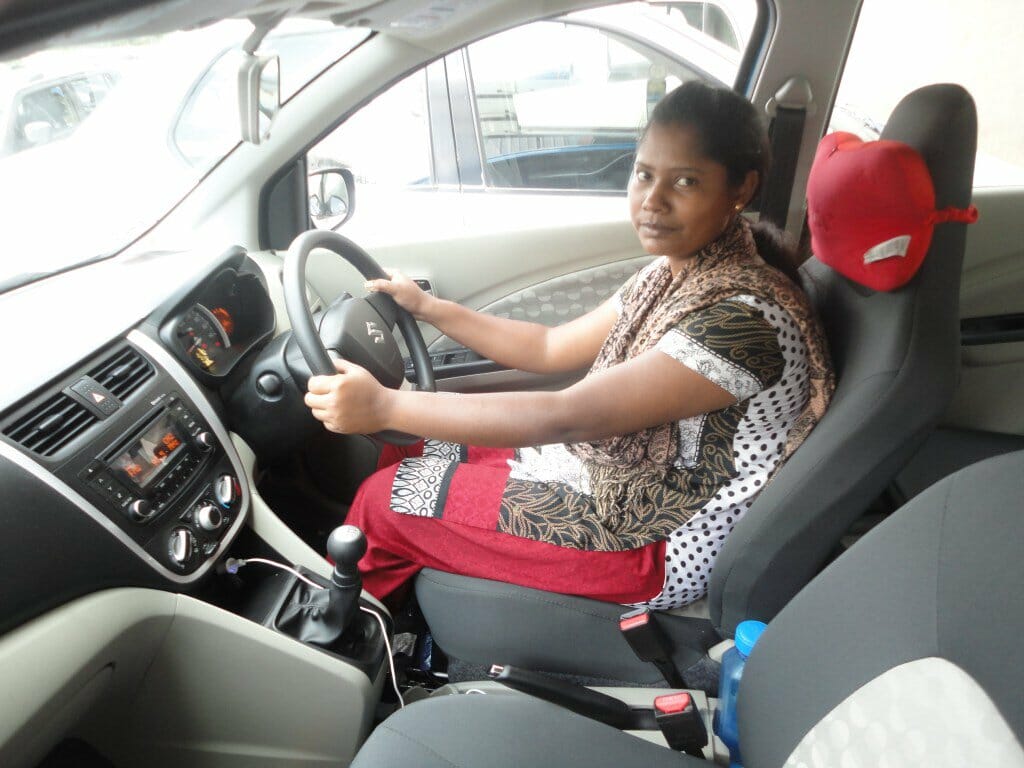
With about 15 chauffeurs and 12 trainers working full time, TaxShe has clocked about 1.2 million rides so far. Their services include driving children to schools and tuitions by tying up with parent communities; providing services to women working in corporates through company tie ups; and occasionally offering airport services. “We are not in any partnership with the airport and we do not park at the airport parking since we are few in number. Instead we use pay parking,” says Vandana.
Chauffeurs sign a year and a half agreement with TaxShe, after which, if they are willing, they can enter into a lease agreement for the car and become a business partner with TaxShe. “In addition to that, our girls who drive at night are rigorously trained in self-defence and are taught how to repair and maintain the cars so that they don’t have to rely on anyone in case of an emergency.”
Road ahead
GoPink is currently offering rides to and from the airport, outstation rides, and city-to-city rides only. “We are yet to develop an app like Ola and Uber. Since a majority of our rides are connected with the airport, we are working to establish separate teams for other services,” says Anuradha.
Vandana says the main challenge in this industry is funding. “We get a standing ovation wherever we go, but when we talk about investment, the responses are not very enthusiastic.” She believes that TaxShe should be viewed as more than just a social cause. It should be seen as a business venture.
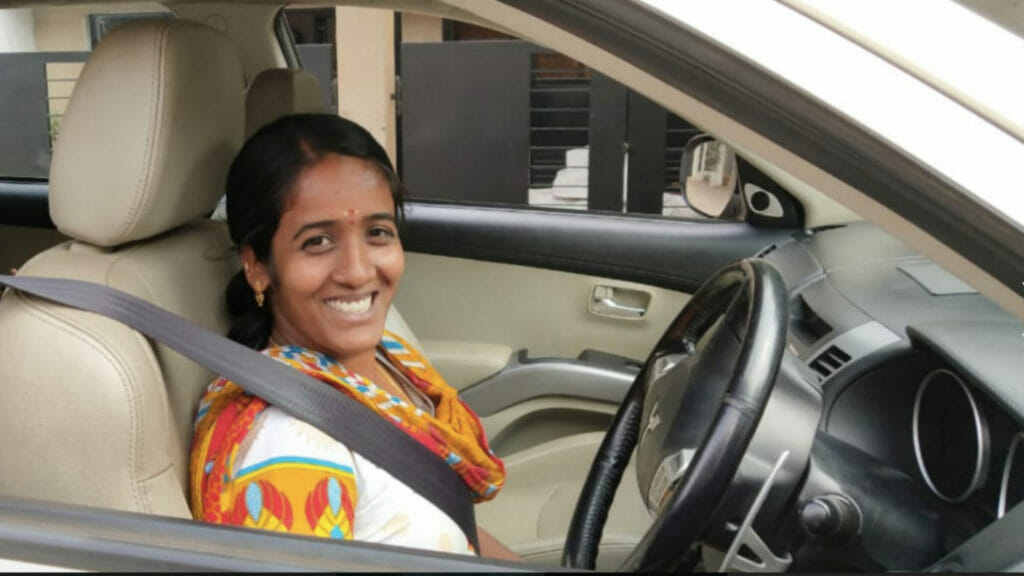
Vandana wants to work towards changing the mobility industry for women. “The more the competition in this sector the better, as this would ensure safer rides for women.”
Kalyani, however, appeals: “We only request the government to provide us with subsidies to buy electric cars, since diesel cars are being phased out.”
However, the entrepreneurs have succeeded despite challenges. “With every obstacle that came our way, we managed to live up to our vision of safe rides and financial independence for women. If you’re passionate about driving, I would suggest don’t stop,” says Anuradha.
- Booking for GoPink cabs can be done via their website http://www.gopinkcabzz.com/ or on call
- Booking for TaxShe can be done via their website https://www.taxshe.com/
- GoPink rides are charged as Rs. 30 per km from city to airport and Rs. 33 per km from the airport to the city
- TaxShe Breakfree training costs Rs. 600-Rs 700 per hour
- Another cab service, WomenCabs.com operates in Bengaluru. Visit their website for details: https://www.womencabs.com/